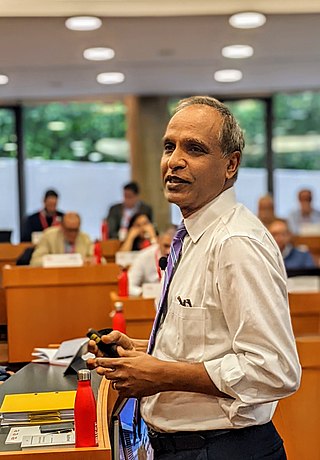Related Research Articles

Finance is the study and discipline of money, currency and capital assets. It is related to, but not synonymous with economics, which is the study of production, distribution, and consumption of money, assets, goods and services . Finance activities take place in financial systems at various scopes, thus the field can be roughly divided into personal, corporate, and public finance.
Financial economics is the branch of economics characterized by a "concentration on monetary activities", in which "money of one type or another is likely to appear on both sides of a trade". Its concern is thus the interrelation of financial variables, such as share prices, interest rates and exchange rates, as opposed to those concerning the real economy. It has two main areas of focus: asset pricing and corporate finance; the first being the perspective of providers of capital, i.e. investors, and the second of users of capital. It thus provides the theoretical underpinning for much of finance.

Robert Cox Merton is an American economist, Nobel Memorial Prize in Economic Sciences laureate, and professor at the MIT Sloan School of Management, known for his pioneering contributions to continuous-time finance, especially the first continuous-time option pricing model, the Black–Scholes–Merton model. In 1997 Merton together with Myron Scholes were awarded the Bank of Sweden Prize in Economic Sciences in Memory of Alfred Nobel for the method to determine the value of derivatives.

Fischer Sheffey Black was an American economist, best known as one of the authors of the Black–Scholes equation.
Real options valuation, also often termed real options analysis, applies option valuation techniques to capital budgeting decisions. A real option itself, is the right—but not the obligation—to undertake certain business initiatives, such as deferring, abandoning, expanding, staging, or contracting a capital investment project. For example, real options valuation could examine the opportunity to invest in the expansion of a firm's factory and the alternative option to sell the factory.

In finance, valuation is the process of determining the value of a (potential) investment, asset, or security. Generally, there are three approaches taken, namely discounted cashflow valuation, relative valuation, and contingent claim valuation.
Monte Carlo methods are used in corporate finance and mathematical finance to value and analyze (complex) instruments, portfolios and investments by simulating the various sources of uncertainty affecting their value, and then determining the distribution of their value over the range of resultant outcomes. This is usually done by help of stochastic asset models. The advantage of Monte Carlo methods over other techniques increases as the dimensions of the problem increase.
Stewart Clay Myers is the Robert C. Merton Professor of Financial Economics at the MIT Sloan School of Management. He is notable for his work on capital structure and innovations in capital budgeting and valuation, and has had a "remarkable influence" on both the theory and practice of corporate finance. Myers, in fact, coined the term "real option". He is the co-author with Richard A. Brealey and Franklin Allen of Principles of Corporate Finance, a widely used and cited business school textbook, now in its 11th edition. He is also the author of dozens of research articles.
John Burr Williams was an American economist, recognized as an important figure in the field of fundamental analysis, and for his analysis of stock prices as reflecting their "intrinsic value".
Financial modeling is the task of building an abstract representation of a real world financial situation. This is a mathematical model designed to represent the performance of a financial asset or portfolio of a business, project, or any other investment.
The following outline is provided as an overview of and topical guide to finance:

Krishna Palepu is an American academic, author, consultant and director of various corporations. He is the Ross Graham Walker Professor of Business Administration at Harvard Business School. He serves as Senior Adviser to the President of Harvard University for Global Strategy.
Sheridan Dean Titman is a professor of finance at the University of Texas at Austin, where he holds the McAllister Centennial Chair in Financial Services at the McCombs School of Business. He received a B.S. degree (1975) from the University of Colorado and an M.S. (1978) and Ph.D. (1981) from Carnegie Mellon University.
Jennifer N. Carpenter is an American finance academic best known for her pioneering research into executive stock options. Other interests include fund manager compensation, survivorship bias, corporate bonds, and option pricing. She has been published in numerous journals including the Journal of Finance, the Journal of Financial Economics, the Review of Financial Studies, and the Journal of Business.
In finance, a contingent claim is a derivative whose future payoff depends on the value of another “underlying” asset, or more generally, that is dependent on the realization of some uncertain future event. These are so named, since there is only a payoff under certain contingencies. Any derivative instrument that is not a contingent claim is called a forward commitment.

Corporate finance is the area of finance that deals with the sources of funding, and the capital structure of corporations, the actions that managers take to increase the value of the firm to the shareholders, and the tools and analysis used to allocate financial resources. The primary goal of corporate finance is to maximize or increase shareholder value.
Jeremy James Siegel is the Russell E. Palmer Professor of Finance at the Wharton School of the University of Pennsylvania in Philadelphia, Pennsylvania. Siegel comments extensively on the economy and financial markets. He appears regularly on networks including CNN, CNBC and NPR, and writes regular columns for Kiplinger's Personal Finance and Yahoo! Finance. Siegel's paradox is named after him.
Hayne Leland is an economist and professor emeritus at the University of California, Berkeley. Prior to becoming emeritus, he was the Arno Rayner Professor of Finance at the Haas School of Business. Before joining Berkeley, Leland was an assistant professor in economics at Stanford University, and he has held visiting professorships at the University of California, Los Angeles and the University of Cambridge. He received his A.B. from Harvard College, followed by an M.Sc.(Econ) at the London School of Economics and a Ph.D. in economics from Harvard. He received an honorary doctorate degree from the University of Paris (Dauphine) in 2007.
Timothy Riddiough is an American researcher and academic. He is the James A. Graaskamp Chair and the Chair of the department of real estate and urban land economics at University of Wisconsin–Madison. He is best known for his work on credit risk in mortgage lending, mortgage securitization, real options, REIT investment and corporate finance, and land use regulation.

The following outline is provided as an overview of and topical guide to corporate finance:
References
- 1 2 3 4 "Timothy A. Luehrman: Biography". Harvard Business School. Archived from the original on November 1, 2007.
- ↑ Luehrman, T., “Strategy as a Portfolio of Real Options,” Harvard Business Review, 76 (5), 1998, pp. 89-99.
- ↑ "Strategy as a Portfolio of Real Options" . Retrieved 4 March 2016.
- ↑ "Investment Opportunities as Real Options: Getting Started on the Numbers" . Retrieved 4 March 2016.